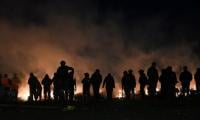The road of self-delusion
The statement issued by Sartaj Aziz last Tuesday on Obama’s visit to India was designed in part to reassure the public that the government is alive to the challenges posed by the expanding strategic partnership between the US and India and that it is dealing with the problem. But in
By Asif Ezdi
February 02, 2015
The statement issued by Sartaj Aziz last Tuesday on Obama’s visit to India was designed in part to reassure the public that the government is alive to the challenges posed by the expanding strategic partnership between the US and India and that it is dealing with the problem. But in fact the government’s reaction to the US president’s visit to our neighbour has achieved the exact opposite by reinforcing doubts about the capacity of the government to address the huge challenges the country is facing, both internally and externally.
The threat that the US-India tie-up poses to Pakistan’s security is of course older than Obama’s visit to India. It was first clearly signalled by the decision of the Bush presidency in 2005 to “make India a global power”, as the then secretary of state Condoleezza Rice put it, and the accompanying nuclear deal between the two countries. This policy has been continued and taken further by Obama.
Obama’s recently concluded visit to India suggests tacit US acquiescence in, if not blessing for, India’s policy of trying to overawe Pakistan through a show – and possibly the exercise – of its military prowess. In an article last week in an Indian newspaper, Daniel Markey, senior fellow at the Council on Foreign Relations, called it a strategy of “peace through strength” and likened it to that followed by Reagan towards Moscow, which is credited with having brought about the collapse of the Soviet Union.
Markey writes approvingly of Modi’s sabre-rattling and expresses the opinion that a “firm display of India’s strength” has the “potential” to “finally [resolve] the India-Pakistan dispute”. India already enjoys tremendous advantages over Pakistan, he writes, and “could turn the existing imbalance into a rout” for Pakistan by “[outracing] Pakistan on the nuclear front” and by accelerated conventional force acquisitions. Investment by India in nuclear capabilities, such as submarine-launched missiles and missile defence systems, he says, would prove extraordinarily costly for Pakistan to match or overcome. In the area of conventional weaponry, he suggests, India could “engineer a real technological leap forward by landing breakthrough deals with US defence manufacturers”.
Markey acknowledges that Pakistan could respond to India’s escalations in a tit-for-tat manner, refusing to accept Delhi’s dictates no matter the cost. This could “lead to war or a violent implosion”. Either would be worse for India (and everyone else), he says, than the troubling status quo. Nevertheless, he advises the US government against “urging India’s forbearance and restraint”, arguing that “it is inconsistent with Washington’s longer-term agenda of cultivating a partnership with India as a strong global power and US partner”. Markey also writes of India’s ability to launch covert operations to undermine Pakistan’s stability, and refers in this context to an old article by Doval, currently India’s national security adviser, advocating subversive action against Pakistan.
We do not know for certain whether Obama followed Markey’s advice not to counsel Modi to exercise restraint in pursuing his policy of “peace through strength” with Pakistan. But it is highly unlikely that Obama would have cautioned the Indian prime minister to moderate his policy of adventurism towards Pakistan. The Modi government has publicly warned that India would impose an “unaffordable” cost on Pakistan and make it “feel the pain” if it does not change its policies. Obama values his country’s strategic relations with India and his personal ties with Modi far too much to waste his breath on such a trivial matter as Pakistan’s security.
While Obama had his grounds for not urging Modi to abandon his reckless course against Pakistan, the government’s restraint in exposing India’s hand in terrorist attacks in Pakistan is not understandable. It is no secret that RAW has had a close working relationship with its Afghan counterpart and treats the whole of Afghanistan as a safe haven for its operations against Pakistan. Press reports suggest that Pakistan has recently provided proof of Indian involvement to the US, including evidence of Indian hand behind the Peshawar school carnage. This is a welcome though belated step but it is not enough. The government should also consider sharing this information with other interested countries and with the UN Security Council’s Counter-Terrorism Committee.
As on the issue of the Indian hand in terrorism in Pakistan, the government has no coherent strategy in the face of the India-US tie-up to deny peaceful nuclear technology to Pakistan and to make India a permanent member of the UN Security Council. The government seems to think that an occasional press statement bewailing the “discriminatory” and “unjust” policies of the US on these matters is enough. Top-level commitment and engagement on both these issues is completely absent. Nawaz had several hours of talks, formally and informally, with Kerry in Islamabad shortly before Obama’s India visit but did not raise either of these two issues with the US secretary of state.
The government did raise Kashmir with Kerry privately and publicly, as did Nawaz in his telephone conversation with Obama last November, urging the US president to take it up with Modi on his visit to India. Not surprisingly, Obama steered scrupulously clear of the issue. As he watched the military parade on India’s Republic Day, he must have known that there was a complete shutdown in Kashmir to protest the Indian occupation. Yet, in his many speeches in India totalling a couple of hours, Obama did not once name Kashmir, not even to repeat the official US public position that it is a matter for bilateral talks between Pakistan and India. Nor did he touch on recurring ceasefire violations, although there was some heavy mortar shelling by India on several Pakistani villages along the Working Boundary on the day of Obama’s arrival.
As Omar Abdullah joyously told the world on Twitter, the only place in which Kashmir figured during Obama’s visit was on the menu at the banquet for the visiting president, which featured two Kashmiri specialties: veg haak and mutton gushtaba. Nevertheless, Special Assistant Fatemi said in a TV interview that he saw a glimmer (halki si jhalak) of hope on Kashmir in Obama’s speech on the last day of his visit in which he urged India to promote religious tolerance. Our capacity for self-deception obviously knows no bounds.
Last but not least, it is remarkable that the adviser’s statement expressing concern at understandings reached between the US and India during Obama’s visit makes no mention of the statement of the two leaders on a ‘Joint Strategic Vision of the Asia Pacific and Indian Ocean Region’. Our government evidently finds nothing disquieting in the US support for a larger Indian role in the ‘Indo-Pacific region’ stretching from Africa to East Asia and fails to see that it is aimed largely at neutralising China’s influence and at isolating Pakistan in the region. Nor is the government perturbed at the fact that Washington is pushing for India’s admission into APEC while keeping the door closed on Pakistan.
The explanation for this monumental strategic blindness was given by Sartaj in a speech last Thursday. “Any apparent worries that some observers may have generated” over “US keenness to push India towards its Asia Pivot in the eastern half of Asia” were unwarranted, he pontificated, because “Pakistan is an important player in the Western half of Asia, which includes Afghanistan, Iran and the whole of Central and West Asia”. “As one of the few stable and well-functioning states in the Muslim world”, he went on, “Pakistan’s role in promoting stability and in facilitating connectivity in this important part of Asia, is indispensable and well-recognised not only by USA but also by Russia and China.” Our policymakers are obviously not living in the real world.
The government’s capacity to lull itself into a false sense of security is simply staggering. Sartaj’s soothing remarks on Indian ambitions in the ‘Indo-Pacific region’ remind us of those who argued a decade ago that Pakistan had nothing to worry from the India-US nuclear deal which was then being negotiated. If the government does not leave the road of self-delusion it is following, the country will have to pay a price.
The writer is a former member of the Pakistan Foreign Service.
Email: asifezdi@yahoo.com
The threat that the US-India tie-up poses to Pakistan’s security is of course older than Obama’s visit to India. It was first clearly signalled by the decision of the Bush presidency in 2005 to “make India a global power”, as the then secretary of state Condoleezza Rice put it, and the accompanying nuclear deal between the two countries. This policy has been continued and taken further by Obama.
Obama’s recently concluded visit to India suggests tacit US acquiescence in, if not blessing for, India’s policy of trying to overawe Pakistan through a show – and possibly the exercise – of its military prowess. In an article last week in an Indian newspaper, Daniel Markey, senior fellow at the Council on Foreign Relations, called it a strategy of “peace through strength” and likened it to that followed by Reagan towards Moscow, which is credited with having brought about the collapse of the Soviet Union.
Markey writes approvingly of Modi’s sabre-rattling and expresses the opinion that a “firm display of India’s strength” has the “potential” to “finally [resolve] the India-Pakistan dispute”. India already enjoys tremendous advantages over Pakistan, he writes, and “could turn the existing imbalance into a rout” for Pakistan by “[outracing] Pakistan on the nuclear front” and by accelerated conventional force acquisitions. Investment by India in nuclear capabilities, such as submarine-launched missiles and missile defence systems, he says, would prove extraordinarily costly for Pakistan to match or overcome. In the area of conventional weaponry, he suggests, India could “engineer a real technological leap forward by landing breakthrough deals with US defence manufacturers”.
Markey acknowledges that Pakistan could respond to India’s escalations in a tit-for-tat manner, refusing to accept Delhi’s dictates no matter the cost. This could “lead to war or a violent implosion”. Either would be worse for India (and everyone else), he says, than the troubling status quo. Nevertheless, he advises the US government against “urging India’s forbearance and restraint”, arguing that “it is inconsistent with Washington’s longer-term agenda of cultivating a partnership with India as a strong global power and US partner”. Markey also writes of India’s ability to launch covert operations to undermine Pakistan’s stability, and refers in this context to an old article by Doval, currently India’s national security adviser, advocating subversive action against Pakistan.
We do not know for certain whether Obama followed Markey’s advice not to counsel Modi to exercise restraint in pursuing his policy of “peace through strength” with Pakistan. But it is highly unlikely that Obama would have cautioned the Indian prime minister to moderate his policy of adventurism towards Pakistan. The Modi government has publicly warned that India would impose an “unaffordable” cost on Pakistan and make it “feel the pain” if it does not change its policies. Obama values his country’s strategic relations with India and his personal ties with Modi far too much to waste his breath on such a trivial matter as Pakistan’s security.
While Obama had his grounds for not urging Modi to abandon his reckless course against Pakistan, the government’s restraint in exposing India’s hand in terrorist attacks in Pakistan is not understandable. It is no secret that RAW has had a close working relationship with its Afghan counterpart and treats the whole of Afghanistan as a safe haven for its operations against Pakistan. Press reports suggest that Pakistan has recently provided proof of Indian involvement to the US, including evidence of Indian hand behind the Peshawar school carnage. This is a welcome though belated step but it is not enough. The government should also consider sharing this information with other interested countries and with the UN Security Council’s Counter-Terrorism Committee.
As on the issue of the Indian hand in terrorism in Pakistan, the government has no coherent strategy in the face of the India-US tie-up to deny peaceful nuclear technology to Pakistan and to make India a permanent member of the UN Security Council. The government seems to think that an occasional press statement bewailing the “discriminatory” and “unjust” policies of the US on these matters is enough. Top-level commitment and engagement on both these issues is completely absent. Nawaz had several hours of talks, formally and informally, with Kerry in Islamabad shortly before Obama’s India visit but did not raise either of these two issues with the US secretary of state.
The government did raise Kashmir with Kerry privately and publicly, as did Nawaz in his telephone conversation with Obama last November, urging the US president to take it up with Modi on his visit to India. Not surprisingly, Obama steered scrupulously clear of the issue. As he watched the military parade on India’s Republic Day, he must have known that there was a complete shutdown in Kashmir to protest the Indian occupation. Yet, in his many speeches in India totalling a couple of hours, Obama did not once name Kashmir, not even to repeat the official US public position that it is a matter for bilateral talks between Pakistan and India. Nor did he touch on recurring ceasefire violations, although there was some heavy mortar shelling by India on several Pakistani villages along the Working Boundary on the day of Obama’s arrival.
As Omar Abdullah joyously told the world on Twitter, the only place in which Kashmir figured during Obama’s visit was on the menu at the banquet for the visiting president, which featured two Kashmiri specialties: veg haak and mutton gushtaba. Nevertheless, Special Assistant Fatemi said in a TV interview that he saw a glimmer (halki si jhalak) of hope on Kashmir in Obama’s speech on the last day of his visit in which he urged India to promote religious tolerance. Our capacity for self-deception obviously knows no bounds.
Last but not least, it is remarkable that the adviser’s statement expressing concern at understandings reached between the US and India during Obama’s visit makes no mention of the statement of the two leaders on a ‘Joint Strategic Vision of the Asia Pacific and Indian Ocean Region’. Our government evidently finds nothing disquieting in the US support for a larger Indian role in the ‘Indo-Pacific region’ stretching from Africa to East Asia and fails to see that it is aimed largely at neutralising China’s influence and at isolating Pakistan in the region. Nor is the government perturbed at the fact that Washington is pushing for India’s admission into APEC while keeping the door closed on Pakistan.
The explanation for this monumental strategic blindness was given by Sartaj in a speech last Thursday. “Any apparent worries that some observers may have generated” over “US keenness to push India towards its Asia Pivot in the eastern half of Asia” were unwarranted, he pontificated, because “Pakistan is an important player in the Western half of Asia, which includes Afghanistan, Iran and the whole of Central and West Asia”. “As one of the few stable and well-functioning states in the Muslim world”, he went on, “Pakistan’s role in promoting stability and in facilitating connectivity in this important part of Asia, is indispensable and well-recognised not only by USA but also by Russia and China.” Our policymakers are obviously not living in the real world.
The government’s capacity to lull itself into a false sense of security is simply staggering. Sartaj’s soothing remarks on Indian ambitions in the ‘Indo-Pacific region’ remind us of those who argued a decade ago that Pakistan had nothing to worry from the India-US nuclear deal which was then being negotiated. If the government does not leave the road of self-delusion it is following, the country will have to pay a price.
The writer is a former member of the Pakistan Foreign Service.
Email: asifezdi@yahoo.com
-
 'Bridgerton' Season 4: Showrunner Talks About Violet's Steamy Romance
'Bridgerton' Season 4: Showrunner Talks About Violet's Steamy Romance -
 John Tesh Recalls ‘uncomfortable’ Backlash Over ’70s Romance With Oprah Winfrey
John Tesh Recalls ‘uncomfortable’ Backlash Over ’70s Romance With Oprah Winfrey -
 Meghan Markle, Prince Harry Problem Was Not ‘work’ During Time With Royals
Meghan Markle, Prince Harry Problem Was Not ‘work’ During Time With Royals -
 Meta Strikes Multi-billion-dollar AI Chip Deal With Google: Will The New Collaboration Pay Off?
Meta Strikes Multi-billion-dollar AI Chip Deal With Google: Will The New Collaboration Pay Off? -
 Gracie Abrams Breaks Silence After Losing 2026 BRIT Award
Gracie Abrams Breaks Silence After Losing 2026 BRIT Award -
 Deon Cole Takes Swipe At Nicki Minaj In Mock Prayer During NAACP Image Awards Monologue
Deon Cole Takes Swipe At Nicki Minaj In Mock Prayer During NAACP Image Awards Monologue -
 Jennifer Garner Reveals The Actress Who 'carried Through Things'
Jennifer Garner Reveals The Actress Who 'carried Through Things' -
 Shamed Andrew ‘awful’ Time As Trade Envoy Is Laid Bare By Insider
Shamed Andrew ‘awful’ Time As Trade Envoy Is Laid Bare By Insider -
 Belgium Seizes Suspected Russian Shadow Fleet Tanker
Belgium Seizes Suspected Russian Shadow Fleet Tanker -
 Liza Minelli Makes Bombshell Claim About Late Mother Judy Garland’s Struggle With Drugs
Liza Minelli Makes Bombshell Claim About Late Mother Judy Garland’s Struggle With Drugs -
 Shipping Giant Maersk Halts Suez Canal, Bab El-Mandeb Sailings Amid Escalating Conflict
Shipping Giant Maersk Halts Suez Canal, Bab El-Mandeb Sailings Amid Escalating Conflict -
 Matthew McCoughaney Reveals One 'gift' He Achieved With Losing Nearly 50 Pounds
Matthew McCoughaney Reveals One 'gift' He Achieved With Losing Nearly 50 Pounds -
 'Scream 7' Breaks Box Office Record Of Slasher Franchise: 'We Are Grateful'
'Scream 7' Breaks Box Office Record Of Slasher Franchise: 'We Are Grateful' -
 Bolivian Military Plane Crash Death Toll Rises To 20
Bolivian Military Plane Crash Death Toll Rises To 20 -
 'Sinners' Star Blasts Major Media Company For 2026 BAFTAs Incident
'Sinners' Star Blasts Major Media Company For 2026 BAFTAs Incident -
 Inside Scooter Braun, Sydney Sweeney's Plans To Settle Down, Have A Baby
Inside Scooter Braun, Sydney Sweeney's Plans To Settle Down, Have A Baby



